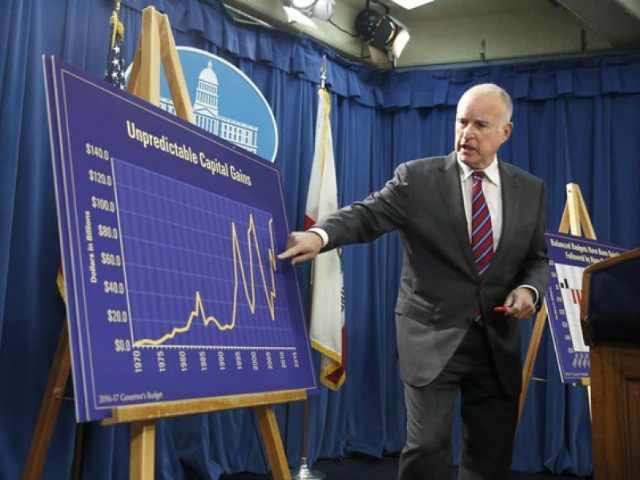Gov. Jerry Brown warned this week that despite record economic growth, California’s $122.8 billion budget will suffer its first deficit since 2012 due to spending growing twice as fast as the economy.
After a near-death experience during the Great Recession that included potentially filing for bankruptcy, California’s economy has roared back to regain its position as the seventh-largest economy in the world. California’s GDP grew at a 3.29 percent rate last year to a record $2.48 trillion. That was about 70 percent faster than the U.S., twice as fast as Germany, 3 times as fast as France and 5 times as fast as Japan.
But in the same time period, California’s Democrat-controlled legislature grew state spending by 7.46 percent per year, over twice the GDP growth rate.
Furthermore, California state and local governments now owe $1.3 trillion for bonds, loans, debt guarantees, unfunded public employee pensions and post-employment benefits. With debt of 52 percent of GDP, “California taxpayers are shouldering debt burdens on a par with residents of peripheral Eurozone states,” according to a new report from the California Policy Center.
At a press conference January 10, Gov. Brown warned that due to revenue growth falling short of projections for five of the last seven months, revenue will only increase by 3 percent. The state Finance Department now projects a $1.6-billion deficit by next summer.
Many Sacramento lawmakers are stunned that the state’s budget forecast could plunge from November’s projected $2.8 billion surplus by the nonpartisan Legislative Analyst’s Office.
Gov. Brown cautioned that California could suffer a much bigger deficit if President-elect Trump is successful in his proposed spending cuts and in dumping Obamacare. “We are in very uncertain times,” Brown said. “We are subject to a lot of unpredictability …. I think it is time for precaution.”
Under Proposition 58, “The California Balanced Budget Act” passed in 2003, California’s governor must pass a balanced budget with a reserve, and produce mid-year budget adjustments in January. That is why Gov. Brown is proposing a state spending freeze, slashing $700 million in annual funding for affordable housing and the state’s building modernization plan; plus eliminating an increase in state-funded child care.
Brown would also freeze the extremely popular “Middle Class Scholarship’”grants. Current family beneficiaries receive up to $20,000 toward attending the University of California and up to $9,000 toward attending the California State University. Grants for the existing 37,000 participants would be phased out by June 30, 2021, saving $115.8 million a year.
California’s ranking Senate budget committee Republican, Sen. Jim Nielsen (R-Gerber), called the budget “perilously balanced” and urged Brown to continue holding the line on spending. But Democrat Assemblyman Kevin McCarty (D-Sacramento) complained, “This is not a time to eliminate important programs that lift up the middle class.”
Gabriel Petek, Standard & Poor’s Credit Market Services’ California analyst, early this year warned, according to CNBC, “The revenue picture has dimmed a little bit.” He stated that the only states with a worse S&P credit rating than California are New Jersey, Kentucky and Illinois.

COMMENTS
Please let us know if you're having issues with commenting.